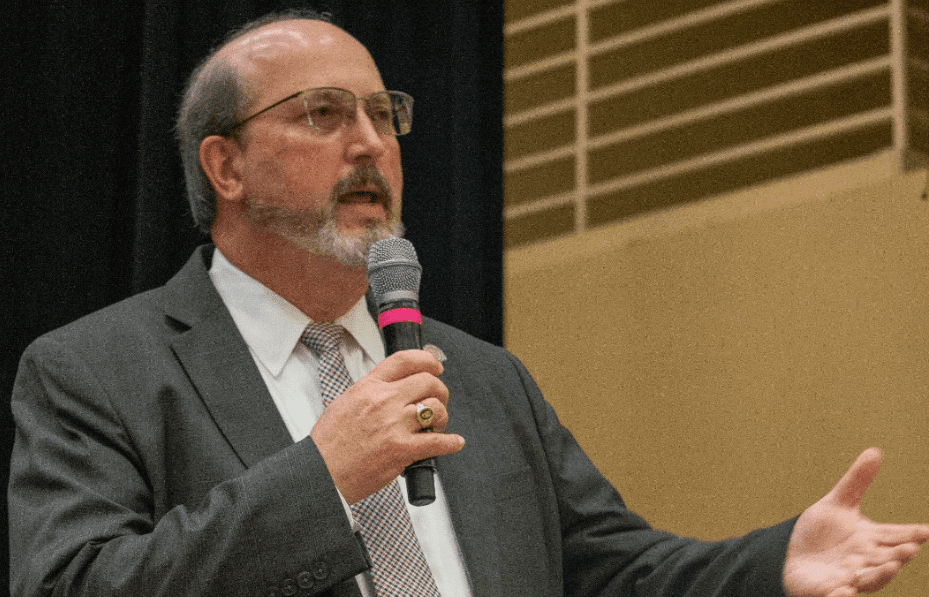
(Photo from MDHS Facebook)
- Anderson was among the speakers invited to address legislative Democrats at a hearing on Tuesday focused on the state’s welfare program.
Mississippi Department of Human Services Executive Director Bob Anderson told state House and Senate Democrats this week that he would be recommending an increase in the amount of Temporary Assistance for Needy Families, or TANF funds available for families per month when the Legislature reconvenes in January.
Anderson was among the speakers invited to address legislative Democrats at a hearing on Tuesday focused on the state’s welfare program.
In recent years, the Legislature increased monthly TANF three-person family payments to $260 a month, a move Anderson supported in 2021. He now wants lawmakers to provide another increase, saying he agrees the cash assistance number “is too low.”
“We’re asking for a $60 increase to take it to $320 as a starting point and then you add $36 for the second person and $24 for each additional person,” Anderson recommended.
In fiscal year 2023, Anderson said 1,602 Mississippi families were in the TANF program representing 2,822 individuals, noting that there are child-only cases which currently receive a $200 minimum TANF payment.
Of those who qualify, 1.9 percent were Hispanic, 2 percent were Native American, 18.9 percent were white, and 79 percent were black.
Per state statute, recipients of TANF are subject to drug testing. Anderson said from August 2023 to June 2024, MDHS drug tested 59 people with a total of 6 testing positive. Rehab was offered to those 6 people if they chose to stay in consideration for the TANF program. Anderson said during that period, the agency spent less than $3,600 on drug testing applicants.
Anderson also told lawmakers that per law, persons in a TANF household must be actively looking for work or risk being cut off from the welfare program. He said under TANF, job skills training, community service, and completing a secondary school program all can qualify for work.

Mississippi receives roughly $86 million annually from the federal government in the TANF program. Notably, the Mississippi Band of Choctaw Indians will begin receiving close to $1.5 million of those funds this fiscal year for those persons who meet the requirements for assistance.
Anderson told lawmakers in fiscal year 2024, about $4.5 million or 5 percent of the agency’s TANF funding went to direct family support and transportation assistance. Another $25 million was converted to childcare development funds for family vouchers, the vast majority of which went to working mothers.
TANF funds are also shared with the Department of Child Protective Services for child welfare. Some $29 million was directed as a subgrant to CPS, Anderson said.
“I’m very pleased with what they’re doing with the money,” Anderson said, noting that a large portion of the funds to CPS are going to home assessments aimed at keeping families out of the child welfare system.
Another $26 million in TANF went to other subgrantees “designed to help get people ready to get in the workforce, to help get them in the workforce or to help them stay in the workforce if they’re already in there,” Anderson said. Subgrantee programs that qualify are workforce training, after school, and parenthood initiative programs to mitigate barriers to recipients.
Some of the subgrantees include Voice of Calvary, Metropolitan YMCA, Boys and Girls Clubs, Canopy Children’s Solutions, and the Institution of Higher Learning’s Complete to Compete program.
Governor Tate Reeves appointed Anderson to lead MDHS in March 2020, entering the role following the revelation of the misspending of nearly $77 million TANF funds under former MDHS director John Davis. Davis has since pled guilty to 5 counts of conspiracy and 13 counts of defrauding the government.
“The Governor asked me to take this job. I agreed to do it four and half years ago, and I’ve tried to everything I can to improve what clearly we all know was a broken program. It was broken in the last administration. It was not doing what it was supposed to do,” Anderson said.
He said the agency is moving toward excellence, but it is “long road” ahead.
“We’re still working on fixing the problem,” Anderson said, adding that since he’s been at the helm the agency has increased transparency and limited the executive director’s role.
“All of us know the biggest problem in 2019 was the executive director that ran this program,” Anderson said, referring to Davis. “So, we have taken the executive director entirely out of the RFP process for TANF grants.”
MDHS now has a subgrant scoring system that takes into account funding risks, site visits, and other financial and outcome assessments and audits, separate from the executive director’s purview. Anderson noted that all subgrants are now under a reimbursement model, saying there are no cash advances given up front for work not yet performed.
You can watch the full hearing below.











